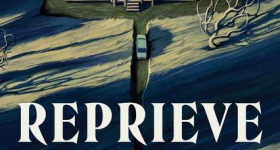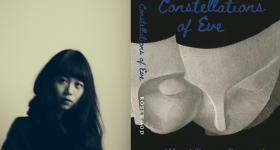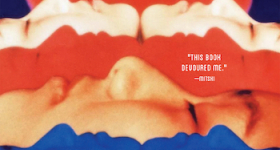For July, we're pleased to bring you an excerpt from Cindy Pon's new dystopic novel WANT. Set in a futuristic Taipei where wealth divides the population into mei, those who can protect themselves from pollution and illness with special suits, and you, those who die early deaths from the terrible environmental conditions, the novel follows Zhou, a young man who, with the help of his friends, is determined to infiltrate the circles of the wealthy in order to effect change. This excerpt takes place early in the novel, after Zhou has kidnapped a wealthy young woman in the hopes of exacting ransom money that can be used towards his goals. We're excited for you to dive into this story, and hope it will leave you wanting to purchase the book!
— Karissa Chen, Senior Literature Editor
Something prickled my consciousness awake; it wasn’t the brightness of day. My eyes snapped open to find the you girl peering at me, her bowl head not an inch away from my nose. I glimpsed her face for the first time. She’d had little work done that I could see: eyes halfway between almond-shaped and slender, a rounded nose, and a full mouth. Her eyes were a light brown, like the watered-down coffee I’d buy with fake cream. Her fingers were extended tentatively above my throat. The back of her hand was bruised where I had jabbed her with the needle. She jumped back when she saw that I had woken. I looked down and remembered the key, then cursed myself for not putting on any clothes the previous night.
“It was only a precaution,” I said, my voice cracking. I cleared my throat and sat up. “You wouldn’t have been able to get out even if you’d gotten it.”
She stood over me, appearing even leaner in the daylight, all long lines and sharp angles.
“The back door’s blocked,” she said in perfect, educated Mandarin.
Her voice surprised me. Rich, like dark chocolate—more womanly than she looked.
“Mudslide,” I said.
She nodded and drew her other hand from behind her back, revealing a pair of dull scissors I kept in the desk. “I could have killed you in your sleep.”
“You would have had to try hard.” I rose, reaching for a clean shirt draped over the back of a wooden chair. It was black, like most of my clothes. “Those scissors are from another century.” I pulled on the shirt, then some blue jeans, and scrubbed a hand through my dyed blond hair, suddenly self-conscious. I had taken off my mask the night before, assuming I would wake up before she did. Now it was pointless, but seeing each other face-to-face like this felt odd. We’d become a society that barely showed our faces to strangers anymore.
Now what?
We stared at each other for a long moment. If she were a feline, her tail would be thrashing.
“How much do you want?” she asked.
I reached for the scissors, and she let go without protest but said, “They were still sharp enough to stab you in the throat.”
I paused, surprised by her boldness. Maybe if I hadn’t woken when I did, I’d be bleeding out on the sofa right now. Game over.
“Are you hungry?” I asked.
Her eyes narrowed, and she shook her head.
“I know you must be thirsty. The sleep spell will do that to you.” I crossed the spare chamber to the corner kitchen and pulled the refrigerator door open, grabbing a bottle of fancy you water, purified and enriched with gods knew what. A case of it cost more than most mei folks’ weekly salary. “Here.” I offered it to her.
She sat down in the wooden chair, turning the bottle in her hand, examining it.
“It’s not tainted,” I said. “The seal’s unbroken.”
She raised her eyes. “How do I drink it?”
Ah.
“Haven’t you ever taken—”
“No. Never in unregulated space.”
“The air isn’t as polluted up here,” I lied.
“I can’t call anyone in helmet.”
“No.” I knew the first thing she’d try upon waking was to call for help. “I’ve jammed the signals.”
She blinked several times, and her nostrils flared.
I glanced away, tamping down my sympathy.
The girl fidgeted with her suit collar, finally lifting her helmet. It came off with a low hiss. Her ponytail sprang free, black and uncolored. The scent of strawberries filled the air, and I took a step back, caught off guard. I had expected you girls to be scentless at best or to smell clinical at worst, like some specimen kept too long in a jar.
Not like fresh, sweet strawberries.
Her eyes truly watered now as she breathed our polluted air for the first time in her life. She doubled over, coughing. I grabbed the bottle from her hand and twisted it open. “Drink.”
She did so, sucking down the water as if it would save her life. Finally, she wiped her mouth with a handkerchief that had been tucked in her sleeve, then pressed it against her eyes. “How do you live breathing this every day?” she asked in a weak voice.
“We don’t have to live for very long,” I replied.
She dropped her handkerchief and stared at me with red-rimmed eyes. “That’s not funny,” she said.
I smiled. “I wasn’t trying to be.” I sat back down on the old sofa, so there was some distance between us.
She was pretty in a way I wasn’t used to. Not like most you girls bowing to the latest beauty trends, indulging in temporary body modifications from reshaping their noses to plumping their lips, or hips, or rears, depending on what was in. You boys kept pace with pec implants and by buying new, chiseled jawlines. But fads came and went, and the yous altered their looks as often as the seasons. The meis, lacking the funds for such drastic changes, resorted to painting their faces in bright colors, using semipermanent tattoos, and dyeing their hair.
Taipei’s youth had become chameleons. If we couldn’t change the dirty smog that smothered our city, we could at least control how we appeared, each metamorphosis more colorful and extravagant than the last.
She finished her water and cast a wary glance my way. “What’s your name?”
“Seriously?” I laughed.
She lifted her shoulders. “I’d guess you’re one year older than I am. Eighteen. Born in the Year of the Horse.” She nodded at the black clothes strewn on the few pieces of furniture in the room. “Dark Horse, I’ll call you.”
I almost smiled but instead pulled out my butterfly knife and began the familiar pattern of flipping it between my fingers and spinning it in my hand. It helped me to think. She tensed, clutching her thighs. She was afraid I might take advantage of her. I wouldn’t, and I had to fight the urge to reassure her, to explain. Putting her at ease wasn’t my job as kidnapper.
“Why so Ro?” Her throaty voice broke my reverie.
Why so Romeo?
She didn’t mean Romeo as in romantic; she meant Romeo as tragic.
I took in my surroundings through her eyes. I lived in an abandoned laboratory that used to belong to Yangmingshan University, an experimental “home” run on sustainable energy. Back when some thought we could still salvage our planet by “going green.” We might have, if enough people had cared. But they hadn’t. The rich were too rich, the poor were too poor, and the middle class—let’s be honest—were only poor people with bigger houses, driving better cars. Now that the majority of us didn’t live past our forties, we cared even less.
My current home consisted of just three rooms: the office, a bathroom, and this main chamber, which included the small kitchen. It held a large, round dining table with a couple of mismatched stools, the ragged turquoise-and-yellow sofa that was at least four decades old, a metal desk, and the wooden chair she sat in. Large windows flanked the southern wall, revealing a thicket of jungle beyond.
I tossed my knife three times, savoring the snick and snap of the blade and handles, before shrugging. “It’s easier to kidnap in black.”
Bad joke. I think her eyes actually smoldered.
I jumped up and grabbed my ancient MacPlus from the desk, opening it. “Put your helmet back on,” I said.
“Why?”
“You’re calling your family.”
She did as I asked, securing her helmet, then took such a deep, full breath, her breasts swelled against her suit. I pretended not to notice.
“You have one minute.” I tapped the necessary commands into my laptop and nodded at her.
We waited in tense silence, but their was no response to the call request.
“My father’s not picking up,” she finally said.
How was that possible? His daughter had been kidnapped.
“Call your mom, then,” I ordered.
Her mother accepted the call immediately. Thank gods.
“Ma!” Daiyu’s voice changed, sounding younger, helpless.
Although her helmet had darkened slightly, I still glimpsed the tears brightening her eyes, seeing her mother’s face in the glass.
I could follow the entire conversation from her one-sided replies.
“Mei you, Mei you. Wo hao.” No, he hasn’t tortured or raped me.
She clasped her hands in front of her face, fingers trembling as if she could keep her mother’s image there.
“Tell her I want three hundred million,” I said.
Her pupils dilated, then shrank, and she saw me again.
“Now!”
“Ta yao san yi,” she whispered.
“Put it in this account.” I gave her the cashcard number for the ghost account that had been set up, and she recited it. “You have two hours.”
“You liang ge xiao shi,” she repeated.
Her mom began asking frantic questions.
Who is he? “Wo bu zhi dao.”
Where are you? “Bu zhi dao!”
I typed a command and severed her connection.
She leaned forward, disoriented, almost falling off of the chair, then tugged her helmet off, throwing it to the ground. It bounced on the bamboo rug and spun twice before I snatched it up.
“Shit!”
She had pulled her legs into her chest on the chair, burying her face between her knees. Her shoulders heaved. When she lifted her head, her pale face was mottled.
“What if you had broken it?” I carefully placed her helmet on the dining table.
“Three hundred million? Are you serious?”
She had some nerve. I’d admire her for it, if her entitlement didn’t piss me off so much. “What? You probably have twice that waiting for you in your trust fund.” The yous didn’t lead the lives that they did without having a few billion to spare.
“What do you want with it?” she asked, crossing her arms, assessing me.
“What do you want with it?” I countered.
We stared at each another, both our breaths coming too quickly. Hers because she was unused to our foul air; mine because I was rattled. Damn this you girl.
“How does my family know to trust you?” she demanded. “That you won’t kill me anyway?”
“You know how it works.” There was an unspoken rule between kidnappers and their targets. The victims always paid in full, and the criminals never killed anyone. Not yet, anyway. But then, no one had ever asked for three hundred million before. That wasn’t my problem. And if I were a betting man, the ransom would be in the ghost account within the hour.
“Can I use your bathroom?” she asked.
I nodded toward the door and she disappeared within, shutting it behind her. I took the moment of privacy to pace the room and analyze my situation. I’d give her family two hours to hustle up the funds. Once cleared, I could deliver the girl back to the night market.
The shower had been running for some time, and I went to the bathroom door, which didn’t lock. “The window’s too small to crawl through,” I shouted. “And the drop to the other side will break your legs, if not your neck.”
The water turned off after another minute. She came out, looking exactly the same and still smelling of strawberries.
“Do you need a towel?” I asked, hiding a smirk behind the last apple I had found in the refrigerator drawer.
“No, thank you,” she said coolly, then proceeded to drink the vitapak I handed her with dainty sips. “Don’t you have any solid foods to eat?”
“Does this look like a five-star you establishment to you?” I asked. “I’ve only got liquids.” Because I couldn’t afford anything more. “Although . . .” Suddenly remembering, I opened a kitchen cabinet. “I do have two ruosong bao from the bakery.”
I gave her one of the buns. “Don’t blame me if you get a stomachache,” I said, taking a big bite out of mine.
She stared at it for a long time, finally trying a nibble and chewing slowly before swallowing. Then she sat very still, as if waiting to die. I finished mine and brushed off my hands. “Well?” I was still hungry.
She took a full bite the next time, challenging me with a lift of her chin. “It’s good,” she said. She glanced out the expansive windows. “Are we on Yangmingshan?” she asked.
“No,” I lied. “Is that the only mountain you know in Taiwan?”
“I haven’t traveled much out of Taipei.” Her face took on an expression that looked like yearning as she gazed into the trees. “Can we go outside?”
I couldn’t hide my surprise. “No.”
“I’ve never been in the mountains before. I won’t run away.”
“You’d get lost. And die.”
She walked to the giant window and pressed herself against it. I wondered what it was like, never having been in the mountains or seen the jungle so close—never to have gone outdoors without a glass bowl over your head.
“All right. Your helmet stays inside. If you’re willing to breathe the air, we can step out for a while.” It was a risk, but so was our entire plan. I was no kidnapper or thief—even if kidnapping and stealing were exactly what I was doing. I hadn’t gotten this far worrying over risks.
She turned, silhouetted by the afternoon light, and actually smiled. The most natural thing was to smile back. I ducked my head and turned. There was nothing natural about this.
“Come on. Stay close.” The heavy door clicked open with my voice command. “I’ve got cucumbers and tomatoes to harvest anyway.”
“What?”
I grabbed her hand, feeling the softness of her skin in my own rough palm. She jerked her arm back, startled, but my grip didn’t loosen. “Do you want to see or not?” I asked.
She nodded, jaw tense, two bright spots on her cheekbones.
I led her along the edge of the house, sweeping aside giant fronds and leaves, past a dozen massive cisterns that collected rainwater. The smell of wet earth filled my senses. We picked our way through the shaded dirt path and veered into a small clearing, where the view of the sky was unobstructed. The sun burned above us, a blistering orb tinged in orange.
The sky used to be blue. This was what my research on the undernet told me, some sites even displaying actual photographs from another time—a pale blue skyline punctuated by skyscrapers or in a deeper hue over a calm sea, so two shades of blue melded like some old painting by a landscape artist. My mind kept returning to this image, the crisp purity of it. Unapologetic and true.
But what could you believe from reading the undernet? Images were more easily manipulated than a you boy’s face. I didn’t know anyone who had ever seen a blue sky. It wasn’t until I had read a novel—published over a century ago—where the author described something in sky blue, that I let myself believe it, feeling wonder and joy and grief all at once.
I never did finish that book.
I suddenly felt the pressure of the you girl’s hand clutching mine. Her flushed face was turned up, eyes squinted against the dull sunlight. She coughed into her sleeve, and when she finally stopped, her breaths came quick and shallow. It was late afternoon, the summer day’s humid heat oppressive.
“Are you all right?” I asked.
She turned to me, eyes gleaming, and said, “I’ve never seen the sky like this before.”
“You mean without your helmet?”
“And so wide. It’s always a dirty brown over Taipei,” she said.
The skies above us were tinged gray with pollution, but not the opaque brown that’s so often seen directly over the city. I led her into my small garden. Cucumbers dangled from a bamboo trellis I had made, nestled within their giant dark green leaves. We stepped between the tomato plants, their fruits small and marred. I stooped down, and she crouched with me as I selected a tomato, dusting it off, then taking a bite. More tangy than sweet. She stared as if I had plucked a rat off the ground and eaten that instead.
“The sky used to be blue,” I said, after I finished the tomato.
“That’s what my grandfather says.”
Grandfather. I’d never met my grandparents, didn’t even know their names. My paternal grandparents were long dead before I was born. As for my maternal grandparents, they lived in America, and I wanted nothing to do with them.
“He’s seen it, then?” I tried to keep my voice from rising. “With his own eyes?”
“He thinks so. But he was very young.” She ran her fingertips over the ridges and bumps of an orange tomato. “He says it feels like a dream when he remembers it.”
Sweat beaded at her temples, and there was a sheen of perspiration above her upper lip. I swiped my arm across my forehead. “I can’t believe how hot it gets,” she said, licking her mouth.
I mirrored her without thinking, tasting the salt on my tongue. “This is what summers are like in Taiwan when you’re not wearing an air-conditioned suit,” I replied and grabbed the woven basket near my feet.
“I’ll help you,” she said.
We spent the next twenty minutes in silence, filling the basket with imperfect tomatoes and cucumbers. The mountain breeze rustled the leaves around us, and the birds sang deep within the jungle’s thicket. When we were done, the you girl’s lips were leeched of color, and wisps of black hair that had escaped from her ponytail clung to her damp neck.
Her breaths still came too fast, like a frightened hare’s. “I think we should go back inside,” I said, lifting the basket.
She rose with me. “I want to try one.”
I angled the basket, and her hand grazed over the tomatoes and cucumbers, touching them as if they were gems instead of meager crops. She finally selected an oblong tomato, redder than the others, and brushed a thumb over its skin before taking a bite. She immediately made a face and shuddered.
I laughed. “No good?”
“It’s more sour than I’ve ever tasted.”
I smirked. No doubt, she’d only ever had perfectly grown specimens. We walked back toward the house, and she appeared thoughtful as she finished the fruit.
“I like that it tastes . . . earthy,” she finally said. I saw her eyes sweep our surroundings as we approached the front of the lab.
The door unlocked with my voice and we stepped back inside the relative coolness of the building. I set the basket on the dining table and nodded at her helmet beside it. “You should put it back on.”
“Later,” she murmured and walked back toward the windows, gazing outward.
I sat on a stool and tapped a few quick commands into my laptop. The funds had transferred in full. I let out a breath, releasing the tension I had held ever since stealing this you girl. Three hundred million had been a gamble, but a gamble worth taking. It was enough for Victor to suit up as a you boy and pretend to be one of them, to infiltrate their closed and elite society. We’d destroy them from within.
We wanted blue skies again.
“What are you going to do with the money?” She turned, her hands clasped in front of her.
I jumped at the sound of her voice and shut the MacPlus. “I don’t know. Redecorate?”
She gave me a leveled look, and I broke away first, taking in the chamber I had called home for the past year. I’d have to leave immediately. I would miss this place.
“I’d suggest a new wardrobe first, Dark Horse.”
I laughed despite myself. “What’s your name, then?”
“Seriously?” She raised her eyebrows in mockery.
I shrugged. “What does it matter now?” I did like her. I wanted to know.
“Daiyu,” she replied.
“From the novel?”
She smiled in surprise, and it made her truly beautiful. “You’ve read it?”
I read voraciously, most often from the undernet, but had found an actual copy of Dream of the Red Chamber stuffed and forgotten in the desk drawer of a junk shop. The owner had given it to me for free, waving me off without a glance. Books weren’t worth the paper they were printed on.
“Flowers in my eyes and birdsong in my ears,” she murmured to herself.
I’d read the book enough times to recognize the line, from a poem that the hero Baoyu used when thinking of the heroine, Daiyu’s namesake.
“Augment my loss and mock my bitter tears,” I replied.
She glanced toward me, eyes gleaming from the pollution—or fear, I didn’t know. “You have read it.”
It was a favorite of mine. But she didn’t need to know that. Instead, I said, “You don’t look the tragic heroine to me.”
“Don’t I?” She had been leaning against the glass and straightened now, squaring her shoulders. But not before I caught a glimpse of wistfulness in her eyes. Of longing. What more could a you girl possibly want when she already had everything?
“We better go,” I said. “I need to return you to your family, and it’ll be dark soon.”
Daiyu lifted her helmet and adjusted her collar before fitting it over her head. And in an instant she was something other to me, something less human. It was hard to believe there was an almost-normal girl beneath the glass. A smart one with a sense of humor.
“I’ll have to give you the sleep spell again,” I said apologetically.
“No. Blindfold me if you have to.”
“I can’t risk it. I’ve added something so you’ll forget.” I could see her eyes widen in panic, even with her helmet on. “Not everything. Just the past twenty-four hours.”
She shook her head. “Please don’t.”
But I took her hand, was already pulling her to the door. “It’s safer for us both if you don’t remember anything. Trust me.” I felt stupid the moment I uttered the last words.
We were out in the muggy humidity of the late afternoon again. It would take a few hours at least to walk to the mountain’s base, and by then, night would have fallen. Even if I were abandoning the lab, I still couldn’t risk her remembering this place, remembering me.
The sunlight glinted off her helmet, and I was glad I couldn’t see her features clearly as I tugged her to me. She resisted, but I was stronger. So she stepped forward instead, bunching the fabric of my shirt in one hand.
“But I want to remember,” she said.
I grabbed her wrist. Stuck the syringe into her open palm. Its hiss seemed too loud to my ears.
“We all do,” I whispered and caught her as she fell.
Courtesy of Simon Pulse










Comments